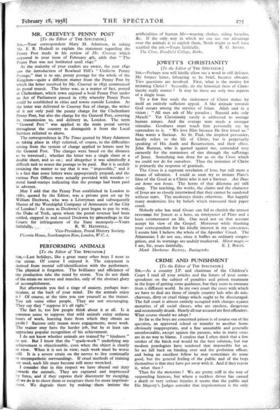MR. CREEVEY'S PENNY POST
[To the Editor of THSPECT' ATOP.] Slit,—Your correspondent Mary M. Adamson, in asking Mr. E. R. Hodsoll to explain the statement regarding the Penny Post made in his _review of Mr. Creevey which appeared in your issue of February 4th, adds that "The Penny Post was not instituted until 184o."
As the majority of your readeis are aware, the year 1840 saw the introduction of Rowland Hill's "Uniform Penny Postage," that is to say, penny postage for the whole of the Kingdom—'-quite a different Matter from the Penny Post by which the letter received by Mr. Creevey in 1832 commenced its postal transit. The letter was, as a matter of fact, posted at Cheltenham, which town enjoyed a local Penny Post under an Act of Parliament passed in 1765 whereby Penny Posts could be established in cities and towns outside London. As the letter was delivered to Creevey free of charge, the writer of it not only paid the penny charge for the Cheltenham' Penny Post, but also the charge for the General Post, covering its transmission to, and delivery in, London. The term "General Post" was applied to the main postal service throughout the country to distinguish it from the Local Services referred to above.
The correspondence in The Times quoted by Mary Adamson as taking place in 1837 referred, of course, to the difficulties arising from the system of charge applied to letters sent by the General Post. The charges were based on the distance to be traversed ; whether the letter was a single sheet or a double sheet, and so on ; and altogether it was admittedly a difficult task to assess the postage to be paid. But it is unduly straining the matter to say that it was "impossible," and it is a fact that some letters were appropriately prepaid, and the various Post Offices were actually provided with wooden or metal hand-stamps indicating that the postage had been paid in advance.
May I add that the Penny Post established in London in 168o, quoted by the Editor, was a private post set up by William Dockwra, who was a Liveryman and subsequently Master of the Worshipful Company of Armourers of the City of London? As soon as Dockwra's post began to pay its way, the Duke of York, upon whom the postal revenue had been settled, stepped in and ousted Dockwra by pieteedings in the Courts for infringement of the State monopoly.—Yours faithfully, R. W. HATSWFLL, , Vice-President, Postal History Society.
Victoria House, Southampton Row, London, W.C. r .










































 Previous page
Previous page